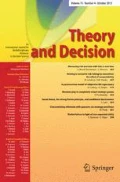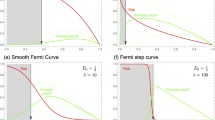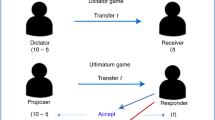Abstract
Previous research has discovered a curious phenomenon: groups cooperate less than individuals in a deterministic prisoner’s dilemma game, but cooperate more than individuals when uncertainty is introduced into the game. We conducted two studies to examine three possible processes that might drive groups to be more cooperative than individuals in reducing risks: group risk concern, group cooperation expectation, and pressure to conform to social norms. We found that ex post guilt aversion and ex-post blame avoidance cause group members to be more risk concerned than individuals under uncertainty. These concerns drive groups to choose the cooperation (and risk-reduction) strategy more frequently than individuals. Groups also have higher cooperation expectations for their corresponding groups than individuals have for their corresponding individuals. We found no evidence of pressure to conform to social norms driving groups to be more cooperative than individuals.
Similar content being viewed by others
References
Baumeister R. F., Stillwell A. M., Heatherton T. F. (1994) Guilt: An interpersonal approach. Psychological Bulletin 115: 243–267
Charness G., Dufwenberg M. (2006) Promises and partnership. Econometrica 74(6): 1579–1601
Charness G., Jackson M. O. (2009) The role of responsibility in strategic risk-taking. The Journal of Economic Behavior and Organization 69(3): 241–247
Dawes R. M. (1980) Social dilemmas. Annual Review of Psychology 31: 93–169
Fischbacher U. (2007) Z-Tree: Zurich toolbox for ready-made economic experiments. Experimental Economics 10(2): 171–178
Gong M., Baron J., Kunreuther H. (2009) Group cooperation under uncertainty. Journal of Risk and Uncertainty 39(3): 251–270
Heal G., Kunreuther H. (2007) Modeling interdependent risks. Risk Analysis 27(3): 621–634
Kahneman D., Tversky A. (1979) Prospect theory: An analysis of decisions under risk. Econometrica 47: 313–327
Kunreuther H. (2009) The weakest link: Managing risk through interdependent strategies. In: Kleindorfer P. R., Wind (Eds.) Y. (eds) Network challenge: Strategy, profit and risk in an interlinked world. Wharton School Publishing, Upper Saddle River, NJ
Orbell, J., Dawes, R. (1981). Social dilemmas. In G. Stephenson & H. H. Davis (Eds.), Progress in Applied Social Psychology (Vol. 1, pp. 37–65) New York: Wiley.
Seymour B., Daw N. D., Dayan P., Singer T., Dolan R. J. (2007) Differential encoding of losses and gains in the human striatum. Journal of Neuroscience 27: 4826–4831
Tajfel H. (1982) Social psychology of inter-group relations. Annual Review of Psychology 33: 1–39
Turner J. C. (1991) Social Influence. Brooks/Cole Publishing Company, Pacific Grove, CA
Viscusi W. K., Magat W. A., Huber J. (1987) An investigation of the rationality of consumer valuations of multiple health risks. RAND Journal of Economics 18(4): 465–479
Wildschut T., Insko C. A. (2007) Explanations of interindividual-intergroup discontinuity: A review of the evidence. European Review of Social Psychology 18: 175–211
Author information
Authors and Affiliations
Corresponding author
Rights and permissions
About this article
Cite this article
Gong, M., Baron, J. & Kunreuther, H. Why do groups cooperate more than individuals to reduce risks?. Theory Decis 75, 101–116 (2013). https://doi.org/10.1007/s11238-012-9318-3
Published:
Issue Date:
DOI: https://doi.org/10.1007/s11238-012-9318-3




